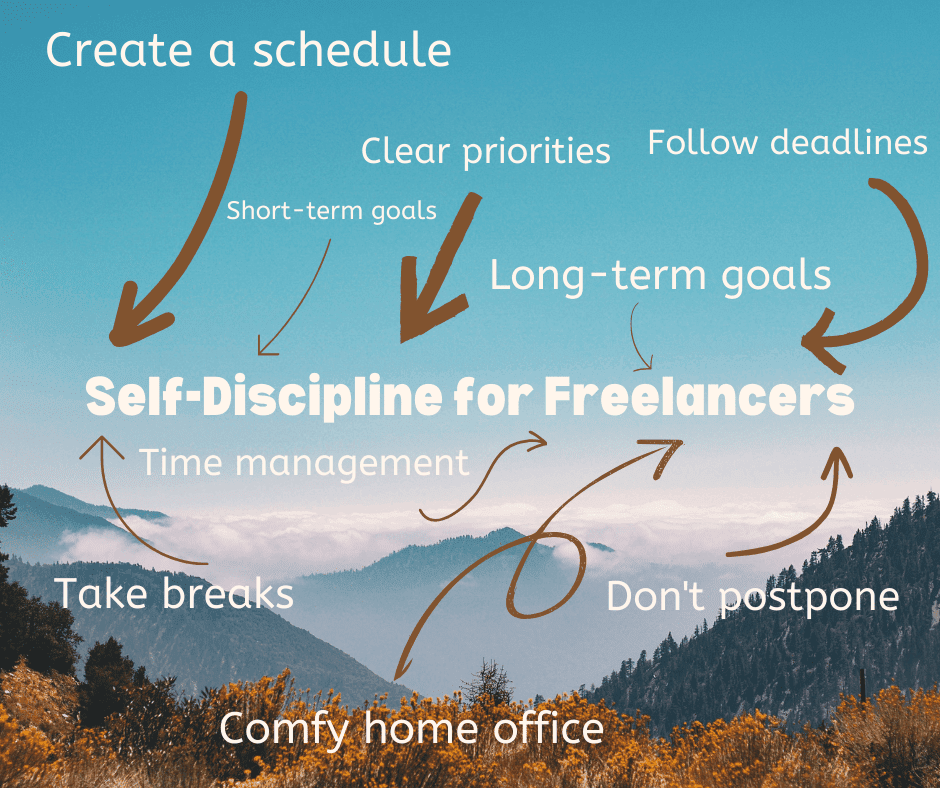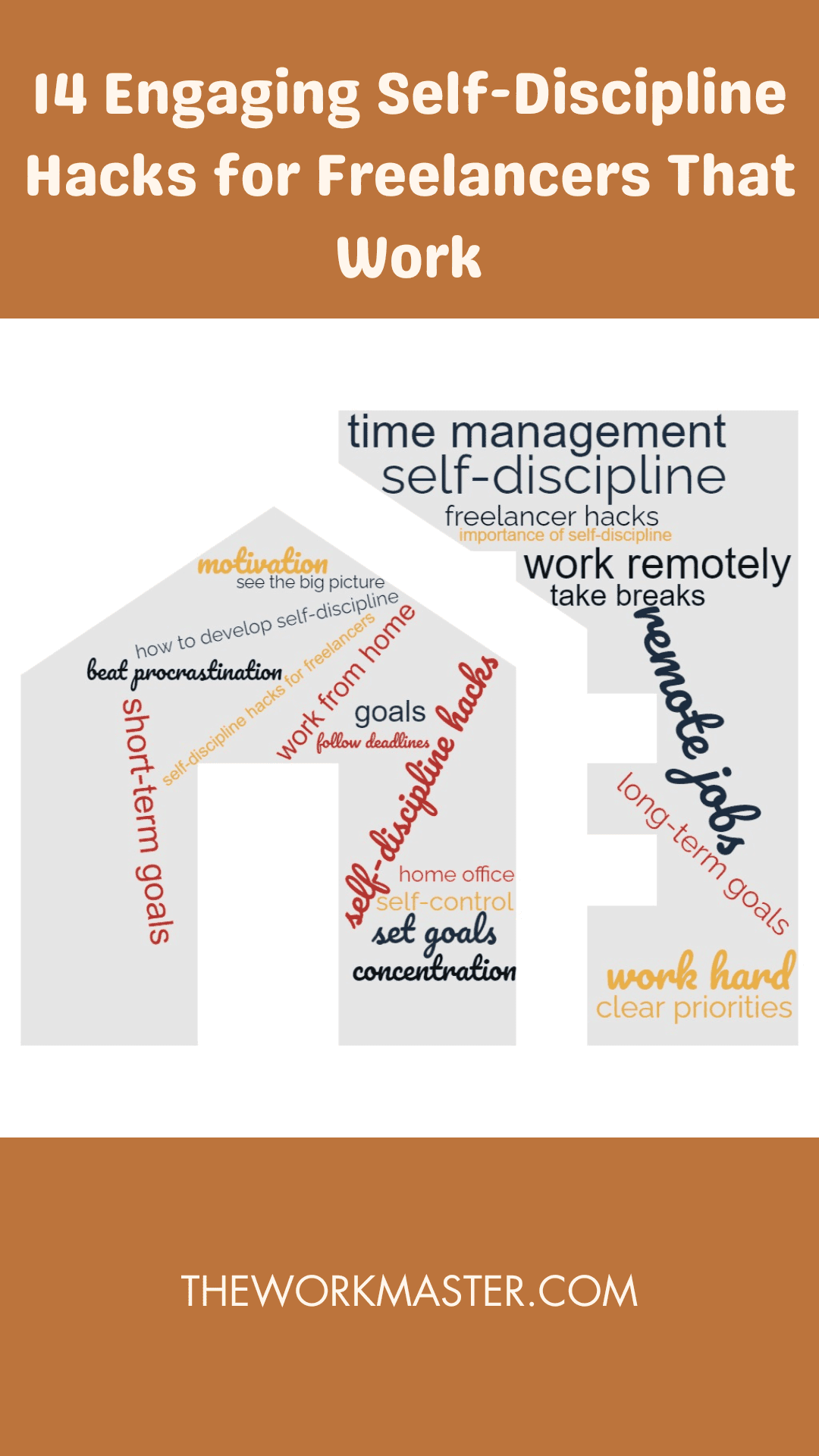Прочети на Български ==> Read in English (US)
In this post, we'll review tricks that will help you reveal the power of self-discipline and upgrade your skills for remote work.
Working from home comes with a new set of responsibilities, and as a freelancer, you must create a strategy to keep yourself running smoothly.
It's a fascinating career and taking the right steps will help you be successful and motivated. One of the most important qualities you can grow in your character when you decide to join the remote work market is self-discipline.
Although it sounds serious, it's just a skill you get to learn using tricks and known tactics.
The Power of Self-Discipline: How to Work Better from Home
- Relax during work
- Create a comfortable space
- Say "I'll do it now!" instead of "I'll do it later."
- Finish a day or two before the deadline
- Creating a Schedule: Pros and Cons
- Set short-term and long-term work goals
- Get motivated by your end goal
- Learn how to solve problems efficiently
- Make your priorities clear
- Time management trick to boost your self-discipline
- Multitasking - Yes or No?
- Manage distractions wisely - or don't!
- The "No other choice" hack
- Your motivation lies in the future
- Self-Discipline FAQ
- How do I use the power of self-discipline and avoid procrastinating as a freelancer?
- What is the importance of self-discipline in freelancing?
- Why is self-discipline so hard to get?
- Final Thoughts about the Power of Self-Discipline
In this post, we are going to explore the widely-known, as well as the less popular self-discipline hacks that you can use daily to boost your work-life routine. Are you ready? Keep reading!
1. Relax during work
It might sound counterintuitive, but you will be more productive when you are less stressed. Relaxing will let you keep focus, and prioritize better.
Avoid constant pressure to let your body function properly, and this will reduce the mistakes you make. Remember, errors in your job are a normal part of your daily tasks, and the less you are upset about them, the better you will become.
We are all guilty of being tense during work at some point. The face becomes grumpy, the muscles are tight, and your brain is desperately trying to concentrate.
The best results come when you are relaxed, early in the workday as a consequence of your efforts to stay focused and motivated. Productivity is a result of your dedication to have enough rest from work.
2. Create a comfortable space
3. Say "I'll do it now!" instead of "I'll do it later."
Create the habit to quickly jump to work whenever an assignment pops up. If you are available, start working as soon as the work email arrives.
Postponing is tricky, and you want to avoid doing it because it will potentially slow you down. The word "later" is very vague. Later can mean anytime, including never. So be careful how you approach it and use it in your self-talk.
We are what we repeatedly do. Excellence then is not an act, but a habit.
~ Aristotle
In short, if you can do a task "now", just do it, and avoid finding excuses. The more you put your job as a priority, the stronger this habit becomes. In time, it will be easier for you to do it without delays.
4. Finish a day or two before the deadline
Imagine you received a task that takes three days to complete, and you have a week to do it. Which one are you:
⇒ Wait until four days pass and then start working to complete the task right before the deadline.
⇒ Start immediately and complete it four days before the deadline.
Well, the correct answer is somewhere in the middle. Of course, it's great if you can complete everything in the first three days. But if you have other customers or projects, it would not be possible.
The best approach is to always finish a day or two before the deadline as leaving things for the last moment is risky and you'll feel under pressure.
5. Creating a Schedule: Pros and Cons
You started working from home, and your job is flexible allowing you to distribute your hours throughout the work week. However, you have a choice: to have a schedule with specific time frames to help you complete your work during this period or to decide on the go.
It's up to you whether you want to have a routine and follow it strictly or loosen up a bit, and see what happens. For a newbie, it's better to start with a schedule and then experiment to find out what best works for you.
Advantages of Creating a Schedule
If you choose to have a daily routine, you will benefit from the following:
⇛ You will always know when your spare time is and it will be easier for you to plan your other activities during the day.
⇛ It will be easier to cope with procrastination as your work is set to start and finish at a specific hour.
⇛ You will think about work only during the designated time, and no need to plan daily when to start.
Disadvantages of Creating a Schedule
⇛ Having a schedule limits your freedom. Flexibility is one of the major advantages of remote work, and the daily routine reduces it.
⇛ You might develop a dislike for your job if you know that you must follow strict timing.
⇛ A firm schedule can cause you to delay personal assignments and prevent you from maintaining healthy relationships.
6. Set short-term and long-term work goals
The power of self-discipline is tightly connected with the goals you set in your job. If you have a direction and final destination, it's much easier to keep walking.
You can have short-term goals like completing a project with an average daily accuracy of 90% or more. Another goal can be to speed up your work and manage daily tasks faster which will ultimately increase your pay per hour.
Short-term goals are related to your immediate performance at work and can provoke your improvement. Make sure you have at least one short-term goal in place at all times.
If you have something to strive for, it almost turns into a game. You must achieve the small goal to get to the next level and continue your growth towards your long-term goal.
Having short-term goals is not enough. You also need a bigger goal to keep you running. Long-term goals are related to your overall performance in time - increased income, better customer satisfaction, improved credibility, etc.
7. Get motivated by your end goal
This is a great self-discipline hack that will help you stay on track. An end goal is defined by you, and it is similar to the long-term goals you want to achieve.
For example, you want to earn enough money and start investing. Financial freedom is a popular end goal among freelancers, and many people strive to achieve passive income as their end goal.
If you visualize what your life can be when your dream is fulfilled, you will be passionate about the tasks you should do to achieve this standard of living. It's a matter of how strongly you desire to make things happen.
8. Learn how to solve problems efficiently
9. Make your priorities clear
Having self-discipline isn’t just about consistently doing something, it’s instead about systematically regulating, correcting, and adapting your behavior to the changing conditions and circumstances of your life.
10. Time management trick to boost your self-discipline
How to determine how much time you need for a job?
11. Multitasking - Yes or No?
12. Manage distractions wisely - or don't!
In what cases should we allow distractions?
13. The "No other choice" hack
14. Your motivation lies in the future
Self-Discipline FAQ
① How do I use the power of self-discipline and avoid procrastinating as a freelancer?
② What is the importance of self-discipline in freelancing?
To manage your work and life responsibilities, you will need self-discipline. It's the willpower you have that moves you in the direction of your plans and helps you navigate tasks more efficiently.
In the freelancing world self-discipline is a crucial part of their personalities. You are your own boss, and you must make yourself start working.
③ Why is self-discipline so hard to get?
Self-discipline might seem hard to get in the beginning. Each new skill you gain requires extra effort as you start building it. Once you establish a habit of being disciplined, it will be much easier to achieve your goals and follow your deadlines.
Final Thoughts about The Power of Self-Discipline
The benefits of using the power of self-discipline are numerous. You can learn many new skills by just obtaining the ability to manage your goals and plans.
Time management, confidence, motivation, and organizational skills are all related to being able to control your desires to a point where you focus on a goal.
Grab our free hand-picked
list of remote jobs now!
*Includes 148 websites with multiple remote
job offers organized into 7 categories.
Bonus: You'll receive updates on new free resources as soon as they are live.
+ Best remote job recommendations and little-known freelancing hacks for time-saving.



